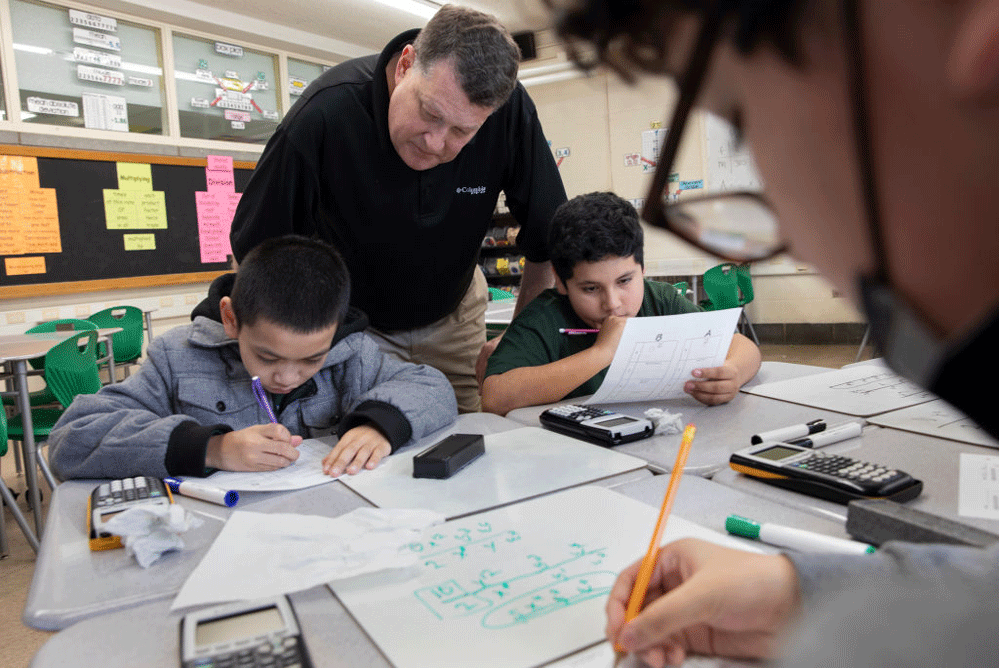How Schools Can Recover Fully: 10 Insights into Pandemic Aftermath in U.S. Education
A curated roundup of headlines about how the pandemic is shaping schools and education policy, vetted by AEI Visiting Fellow John Bailey.

Get stories like this delivered straight to your inbox. Sign up for The 74 Newsletter
This is our biweekly briefing on the pandemic, vetted by John Bailey. See the full archive.
This Week’s Top Story

What It Would Take For Schools to Fully Recover from COVID-19
- Via McKinsey: “Our analysis shows that nationwide, an estimated 17 million students have more than half a year of pandemic-related learning delay, 16 million students who need mental health support are not receiving it and 15 million students are chronically absent.”
- “Several states and districts have seen accelerated rates of learning recovery after adopting high-quality instructional materials (HQIM) and aligned professional development; providing high-quality, high-intensity tutoring; and extending the school year through summer or intensive-learning academies.”
- High-quality materials “paired with high-quality aligned professional development have demonstrated effectiveness in raising students’ state assessment scores.”
- “A more realistic and sustainable approach may be to embed practices into future budgets. Extending the recovery period from one year to two, providing an additional year of HQIM and aligned professional development for teachers, could address 83% of students with pandemic-related learning delays.”
Key Insights
The Chronic Absenteeism Crisis
- Via the Associated Press and Stanford University: Over a quarter of students missed at least 10% of the 2021-22 school year, leading to an estimated 6.5 million more chronically absent students. Absences were more prevalent among Latino, Black and low-income students.
- “In seven states, the rate of chronically absent kids doubled for the 2021-22 school year, from 2018-19, before the pandemic. Absences worsened in every state with available data — notably, the analysis found growth in chronic absenteeism did not correlate strongly with state COVID rates.”

Artificial Intelligence in Education
- John Bailey in EdNext: “In the realm of education, this technology will influence how students learn, how teachers work and ultimately how we structure our education system.”
- “Prompts can also be constructed to get these AI systems to perform complex and multi-step operations. For example, let’s say a teacher wants to create an adaptive tutoring program — for any subject, any grade, in any language — that customizes the examples for students based on their interests. She wants each lesson to culminate in a short-response or multiple-choice quiz. If the student answers the questions correctly, the AI tutor should move on to the next lesson. If the student responds incorrectly, the AI should explain the concept again, but using simpler language.”
- “AI might tackle some of the administrative tasks that keep teachers from investing more time with their peers or students.”
- “AI’s ability to conduct human-like conversations opens up possibilities for adaptive tutoring or instructional assistants that can help explain difficult concepts to students.”
- “There is a risk that more time spent using AI systems will come at the cost of less student interaction with both educators and classmates.”
- “While past technologies have not lived up to hyped expectations, AI is not merely a continuation of the past; it is a leap into a new era of machine intelligence that we are only beginning to grasp. While the immediate implementation of these systems is imperfect, the swift pace of improvement holds promising prospects.”
How the Pandemic Shifted the Geography of Income
- Via Axios
- “A new analysis of tax data by the Economic Innovation Group, shared first with Axios, quantifies the reasons some of America’s biggest cities are struggling to rebuild their economies post-pandemic.”
- “It also shows a surge in income that arrived in many rural and exurban places and in popular vacation destinations.”
- “Not only did residents leave the biggest cities, but those who left disproportionately had high incomes, meaning the hit to those local economies was larger than migration numbers alone would imply.”
- “In San Francisco, out-migration caused a 20% drop in adjusted gross income from 2020 to 2021 as a share of the taxable income of those who stayed put. In Manhattan, that drop was 13%, and in Boston, 11%.”
- “Income flows out of urban areas and towards these growth regions appears to have been driven by upper-income households; in growing counties, in-migrants were on average higher earners than out-migrants, while in shrinking counties, out-migrants earned more than newcomers.”
Declining Kindergarten Enrollments Create Long-Term Challenges for School Systems
- EdWeek on a new study: “More than a third of the national public school enrollment decline since COVID-19 pandemic cannot be attributed to switches to private school or homeschooling, or to a shrinking population of school-aged children, according to new research.”
- “It’s likely that many of the students who are unaccounted for — generally schools’ youngest learners — opted to skip kindergarten altogether, a move that could have long-term consequences for their academic achievement.”
- “ ‘Because such demographic changes are likely to be durable, districts that lost enrollment due to such factors are unlikely to see their enrollment rebound substantially,’ the report says.”
No Evidence Athletes at Risk for Cardiac Arrest after COVID Vaccinations
- CIDRAP: “A study … from researchers at the Amsterdam University Medical Centers reviews all current literature on athletes, sudden cardiac arrest and myocarditis following COVID-19 vaccines, and finds that athletes engaged in intensive activity are not at increased risk for heart complications following vaccination.”
- “An Australian study of more than 4 million young adults showed no increase in out-of-hospital cardiac arrest for those with recent COVID-19 infections or vaccination.”
What Research Says about Tutoring Implementation
- Ed Working Paper: “This study synthesizes 33 articles on the implementation of tutoring, defined as one-to-one or small-group instruction in which a human tutor supports students grades K-12 in an academic subject, to better understand the facilitators and barriers to program success.”
- “We find that policies influenced tutoring implementation through the allocation of federal funding and stipulation of program design.”
- “Successful implementation hinged on the support of school leaders with the power to direct school funding, space and time. Tutoring setting and schedule, recruitment and training, and curriculum influenced whether students are able to access quality tutoring and instruction.”
U.S. Department of Education Announces Key K-12 Cybersecurity Resilience Efforts
- Via Education Department and The 74: The department announced K-12 cybersecurity resilience efforts including the establishment of a Government Coordinating Council, as well as the release of the department’s three K-12 Digital Infrastructure briefs, including K-12 Digital Infrastructure Brief: Defensible and Resilient, Adequate and Future-Proof and Privacy-Enhancing, Interoperable and Useful.
‘How Do I Do That?’ New Hires of 2023 Are Unprepared for Work
- Via The Wall Street Journal: “The … effect of years of remote learning during the pandemic is gumming up workplaces around the country. It is one reason professional service jobs are going unfilled and goods aren’t making it to market. It also helps explain why national productivity has fallen for the past five quarters, the longest contraction since at least 1948, according to the U.S. Labor Department.”
- “The shortcomings run the gamut from general knowledge, including how to make change at a register, to soft skills such as working with others. Employers are spending more time and resources searching for candidates and often lowering expectations when they hire. Then they are spending millions to fix new employees’ lack of basic skills.”
- “Army recruits aren’t communicating within their squads as well as they did before the pandemic, instructors say. Scores on recruiting exams fell 9% since the pandemic and prompted the Army to create a new testing boot camp to help recruits pass, a requirement for gaining admission to the military.”
Strengthening Youth Mental Health: A Governor’s Playbook
- Via National Governors Association: “The Playbook is intended to serve as a tool for states to further impactful policy solutions that strengthen youth mental health.” The central topics are:
- Addressing prevention and building resilience
- Increasing awareness and reducing stigma
- Ensuring access and affordability of quality treatment and care
- Training and supporting caregivers and educators
…On a Lighter NoteRun to the Ball: A dog interrupts a soccer match.
Get stories like these delivered straight to your inbox. Sign up for The 74 Newsletter

;)
